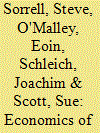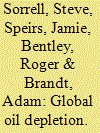|
|
|
Sort Order |
|
|
|
Items / Page
|
|
|
|
|
|
|
| Srl | Item |
| 1 |
ID:
088980


|
|
|
|
|
| Publication |
2009.
|
| Summary/Abstract |
Applying the techniques of decomposition analysis we estimate the relative contribution of ten variables (termed 'key ratios') plus GDP to the change in UK road freight energy use over the period 1989-2004 inclusive. The results are best interpreted as an estimate of the percentage growth in energy consumption that would have resulted from the change in the relevant factor (e.g. length of haul) had the other factors remained unchanged. The results demonstrate that the main factor contributing to the decoupling of UK road freight energy consumption from GDP was the decline in the value of domestically manufactured goods relative to GDP. Over the period 1989-2004 this largely offset the effect of increases in GDP on road freight energy consumption. While the decline in domestic manufacturing was to some extent displaced by increases in imports, the net effect of these supply factors, together with shifts in the commodity mix, has been to reduce UK road freight energy consumption by 30.1%. The net effect on global carbon dioxide (CO2) emissions is likely to be somewhat less beneficial, since many freight movements associated with the manufacture of imported goods have simply been displaced to other countries.
|
|
|
|
|
|
|
|
|
|
|
|
|
|
|
|
| 2 |
ID:
111318


|
|
|
|
|
| Publication |
2012.
|
| Summary/Abstract |
Between 1989 and 2004, energy consumption for road freight in the UK is estimated to have increased by only 6.3%. Over the same period, UK GDP increased by 43.3%, implying that the aggregate energy intensity of UK road freight fell by 25.8%. During this period, therefore, the UK achieved relative but not absolute decoupling of road freight energy consumption from GDP. Other measures of road freight activity, such as tonnes lifted, tonnes moved, loaded distance travelled and total distance travelled also increased much slower than GDP. The main factor contributing to the observed decoupling was the declining value of manufactured goods relative to GDP. Reductions in the average payload weight, the amount of empty running and the fuel use per vehicle kilometre also appear to have made a contribution, while other factors have acted to increase aggregate energy intensity. The results demonstrate that the UK has been more successful than most EU countries in decoupling the environmental impacts of road freight transport from GDP. However, this is largely the unintended outcome of various economic trends rather than the deliberate result of policy.
|
|
|
|
|
|
|
|
|
|
|
|
|
|
|
|
| 3 |
ID:
054705


|
|
|
|
|
| Publication |
Cheltenham, Edward Elgar, 2004.
|
| Description |
x, 349p.
|
| Standard Number |
1840648899
|
|
|
|
|
|
|
|
|
|
|
|
Copies: C:1/I:0,R:0,Q:0
Circulation
| Accession# | Call# | Current Location | Status | Policy | Location |
| 048899 | 333.79/SOR 048899 | Main | On Shelf | General | |
|
|
|
|
| 4 |
ID:
098629


|
|
|
|
|
| Publication |
2010.
|
| Summary/Abstract |
Within the polarised and contentious debate over future oil supply a growing number of commentators are forecasting a near term peak and subsequent decline in production. But although liquid fuels form the foundation of modern industrial economies, the growing debate on 'peak oil' has relatively little influence on energy and climate policy. With this in mind, the UK Energy Research Centre (UKERC) has conducted an independent, thorough and systematic review of the evidence, with the aim of establishing the current state of knowledge, identifying key uncertainties and improving consensus. The study focuses upon the physical depletion of conventional oil in the period to 2030 and includes an in-depth literature review, analysis of industry databases and a detailed comparison of global supply forecasts. This Communication summarises the main findings of the UKERC study. A key conclusion is that a peak of conventional oil production before 2030 appears likely and there is a significant risk of a peak before 2020.
|
|
|
|
|
|
|
|
|
|
|
|
|
|
|
|
| 5 |
ID:
098276


|
|
|
|
|
| Publication |
2010.
|
| Summary/Abstract |
This paper compares and evaluates fourteen contemporary forecasts of global supply of conventional oil and provides some observations on their relative plausibility. Despite the wide range of modelling approaches used and multiplicity of assumptions made, it is shown that forecasts can be usefully compared along two dimensions, namely: shape of future production profile and assumed or implied ultimately recoverable resource of conventional oil. Other differences between forecasts are either secondary or are components of these two parameters. The paper shows how large differences in the assumed size of the resource make relatively little difference to the timing of a global peak in conventional oil production. It also examines the impact of rates of discovery, reserves growth and depletion on the forecast date of peak and shows how forecasts that delay this peak until beyond 2030 rest on assumptions that are at best optimistic and at worst implausible.
|
|
|
|
|
|
|
|
|
|
|
|
|
|
|
|
| 6 |
ID:
098583


|
|
|
|
|
| Publication |
2010.
|
| Summary/Abstract |
This paper compares and evaluates fourteen contemporary forecasts of global supply of conventional oil and provides some observations on their relative plausibility. Despite the wide range of modelling approaches used and multiplicity of assumptions made, it is shown that forecasts can be usefully compared along two dimensions, namely: shape of future production profile and assumed or implied ultimately recoverable resource of conventional oil. Other differences between forecasts are either secondary or are components of these two parameters. The paper shows how large differences in the assumed size of the resource make relatively little difference to the timing of a global peak in conventional oil production. It also examines the impact of rates of discovery, reserves growth and depletion on the forecast date of peak and shows how forecasts that delay this peak until beyond 2030 rest on assumptions that are at best optimistic and at worst implausible.
|
|
|
|
|
|
|
|
|
|
|
|
|
|
|
|
| 7 |
ID:
119799


|
|
|
|
|
| Publication |
2013.
|
| Summary/Abstract |
Energy efficiency improvements by households lead to rebound effects that offset the potential energy and emissions savings. Direct rebound effects result from increased demand for cheaper energy services, while indirect rebound effects result from increased demand for other goods and services that also require energy to provide. Research to date has focused upon the former, but both are important for climate change. This study estimates the combined direct and indirect rebound effects from seven measures that improve the energy efficiency of UK dwellings. The methodology is based upon estimates of the income elasticity and greenhouse gas (GHG) intensity of 16 categories of household goods and services, and allows for the embodied emissions of the energy efficiency measures themselves, as well as the capital cost of the measures. Rebound effects are measured in GHG terms and relate to the adoption of these measures by an average UK household. The study finds that the rebound effects from these measures are typically in the range 5-15% and arise mostly from indirect effects. This is largely because expenditure on gas and electricity is more GHG-intensive than expenditure on other goods and services. However, the anticipated shift towards a low carbon electricity system in the UK may lead to much larger rebound effects.
|
|
|
|
|
|
|
|
|
|
|
|
|
|
|
|
| 8 |
ID:
088023


|
|
|
|
|
| Publication |
2009.
|
| Summary/Abstract |
This paper examines the economic, environmental and distributional impacts of an idealised tradable white certificate (TWC) scheme and shows how the impacts are modified when the scheme operates in parallel with the EU emissions trading scheme (EU ETS). It uses simple graphical techniques to assess whether a TWC scheme will increase, decrease or have an ambiguous effect on electricity demand, wholesale and retail electricity prices, carbon emissions and investment in energy efficiency, paying particular attention to the interpretation of 'additionality'.
Following a comparable analysis of the impact of the EU ETS, the paper examines the implications of introducing a white certificate scheme in a country that is already participating in the EU ETS. It compares the effect of this combination of instruments to that of the EU ETS operating in isolation. It concludes that there is no necessary link between the price of white certificates and marginal cost of energy efficiency investment, the price of electricity or the ability of the suppliers to eliminate free riders from their subsidy schemes. Also, a TWC scheme will make no contribution to reducing global carbon emissions unless and until it leads to a tightening of the EU ETS cap.
|
|
|
|
|
|
|
|
|
|
|
|
|
|
|
|
|
|
|
|
|